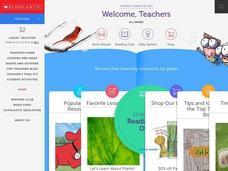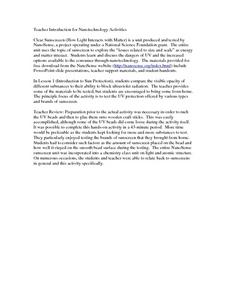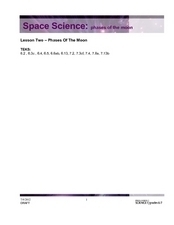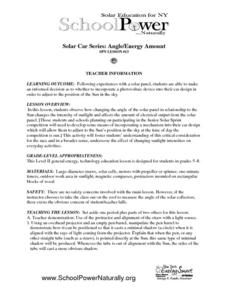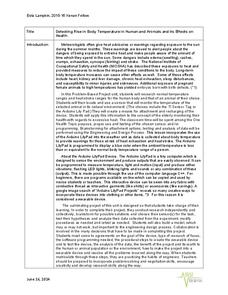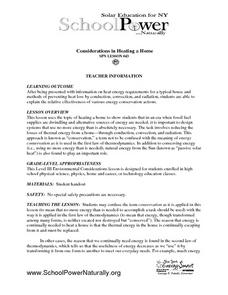Curated OER
What's Up?
Students examine the vocabulary and objects associated with objects in the sky and weather. They observe the sky outside of their classroom and create a list of things in the sky. Students then analyze a poster, read and discuss key...
Curated OER
Nanoscience and Sunscreen
Students use the topic of sunscreen to explore the "issues related to size and scale" as energy and matter interact. They compare the visible opacity of different substances to their ability to block ultraviolet radiation.
Curated OER
Space Science: Phases of the Moon
Looking for a terrific lesson on the phases of the moon that has lots of good worksheets? With two excellent websites are embedded in the plan, the activity is sure to spark some interest in your astronomy unit. Some common...
Curated OER
Our Solar System and Seasons
Sixth graders investigate the relative diameters of planets and distances between them and the cause for seasons on Earth using the 5-E Learning Model. They appreciate the size and distances involved with objects in the real universe....
Curated OER
The Hydrologic (Water) Cycle
Learners construct a model of the hydrologic cycle, and observe that water is an element of a cycle in the natural environment. They explain how the hydrologic cycle works and why it is important, and compare the hydrologic cycle to...
Curated OER
An Environmental Puzzle: The Carbon Cycle
Middle school science stars examine fuels and energy with a variety of activities. They begin with a KWL chart, read an informative passage, and then complete a puzzle. The puzzle itself is included. Cleverly, each piece corresponds to a...
Curated OER
Solar Car Series: Angle/Energy Amount
Does the angle of a solar panel change the output? Emerging engineers find out! Demonstrate for your class how they can angle a straw to match the angle of light rays coming from a source. Then turn them loose to experiment with the...
Gwinnett County Public Schools
Analysis of the Tuck Everlasting and The Birchbark House Text Exemplars
Looking to introduce some text-based questions into your ELA lessons? Practice the kinds of skills the Common Core demands with the seven text-based questions and the essay prompt provided here. Designed to be a three-day lesson, day one...
University of Georgia
Heating and Cooling of Land Forms
Compare heating and cooling rates of different land forms. A lab activity has groups collect data on the rate of heating and cooling of soil, grass, saltwater, fresh water, and sand. An analysis of the rates shows how the different land...
Kenan Fellows
Detecting Rise in Body Temperature in Human and Animals and its Effects on Health
Beat the heat using sensors. Scholars research normal body temperatures for humans and a specific animal. In groups, they create sensors that monitor body temperature, as well as the weather. The goal is to reduce the occurrence of heat...
Curated OER
Considerations in Heating a Home
Emerging engineers discover how important it is to conserve energy as fossil fuel supplies are being diminished. This is accomplished by working through a handout that explains energy requirements for heating a home during the winter....
Curated OER
Heating and Cooling a Really Large Lizard
Remind your middle school scientists how fox ear size varies depending on the climate they live in; large ears allow heat loss while small ears keep heat in. Discuss how a cold-blooded animal might try to regulate body temperature. Then...
Curated OER
The Greenhouse Effect
Why does it get so hot inside of our cars in the summertime? The greenhouse effect! Lab groups experiment to see what happens to an ice cube enclosed in a jar and placed in sunlight as compared to an ice cube outside of the jar. They...
Curated OER
Solar Kit Lesson #8 - Positioning Solar Panels II: Explorations with Stationary Panels
This lesson plan is preparation-intensive, but well worth the investment. You will construct five or six portable testing stations with which lab groups will gather data on the best position for collecting sunlight with a solar panel....
Cornell University
Light Waves: Grades 6-8
Explore the behavior of light with different materials. Collaborative groups determine whether certain materials absorb, reflect, diffract, or transmit light waves. They then measure the angle of incidence and angle of reflection.
Arts & Humanities
Make Your Own Flower Garden
Get into art with a little activity on flower parts. The class reviews basic information regarding flowers and then they use a paper mosaic technique to create visual representations of the lovely plants.
Curated OER
Shadows
Young scholars read books, learn about the letter s, and eat raisins all to learn about shadows. In this shadows lesson plan, students also go outside and look at shadows and sing songs about shadows.
Curated OER
Adaptation and Diversity on Sheffield Island
Written for an exploration of shoreline ecosystems on Sheffield Island, this gives ecology or marine biology buffs a hands-on experience. Using GPS or visual triangulation techniques, they lay transect lines on a high and a low energy...
Curated OER
Sobriety Testing Stations
Students identify each of the different sobriety tests and how they are used to detect the amount of alcohol consumed by a person and the physical affects of drinking alcohol.
Curated OER
Tanning Teens
Students identify the government's role in dealing with health issues among teenagers. They list the major concerns that health officials would have regarding teens and tanning. Students explore the potential role of government in...
Curated OER
Chemical Sleuthing
Students engage in a lesson which includes flame tests and the construction of a simple diffraction spectrograph with which to measure sodium ion emissions. They use the Bragg equation to compute the wavelength of the line spectra produced.
Curated OER
Edible Soils
Students create soil profiles, including rock, clay, silt, sand, and humus, in clear plastic cups out of edible materials.
Curated OER
Navigating by the Numbers
Students observe how math is important in navigation and engineering. They study how surveyors use math and science to calcute, count, measure, label, and indicate distances on a map. They estimate specific distances.
Curated OER
The Wonderful World of Waves (Wave Basics)
Students define amplitude, wavelength, frequency, and period, calculate period given frequency, and calculate frequency given period, define crest and trough and locate both on diagram of wave, differentiate between latitudinal and...
Other popular searches
- Sun Safety Activities
- Summer Sun Safety
- Health & Sun Safety
- Hats Sun Safety
- Media Influence Sun Safety
- Health: Sun Safety
- Ozone and Sun Protection
- Sun Safety Lesson Plans
- Social Influence Sun Safety
- Pool & Sun Safety
- Sun Protection Activities
- Sun Protection Body Care


